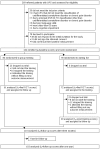Predicting the outcome of a cognitive-behavioral group training for patients with unexplained physical symptoms: a one-year follow-up study
- PMID: 23039913
- PMCID: PMC3549894
- DOI: 10.1186/1471-2458-12-848
Predicting the outcome of a cognitive-behavioral group training for patients with unexplained physical symptoms: a one-year follow-up study
Abstract
Background: Although Cognitive-Behavioral Therapy (CBT) is effective for Unexplained Physical Symptoms (UPS), some therapists in clinical practice seem to believe that CBT outcome will diminish if psychiatric comorbidity is present. The result is that patients with a psychiatric comorbidity are redirected from treatment for UPS into treatment for mental health problems. To explore whether this selection and allocation are appropriate, we explored whether CBT outcomes in UPS could be predicted by variables assessed at baseline and used in routine-practice assessments.
Methods: Patients (n=162) with UPS classified as undifferentiated somatoform disorder or chronic pain disorder were followed up until one year after they had attended a CBT group training. The time-points of the follow-up were at the end of CBT (immediate outcome), three months after CBT (short-term outcome), and one year after CBT (long-term outcome).CBT outcome was measured using the Physical Component Summary of the SF-36, which was the primary outcome measure in the randomized controlled trial that studied effectiveness of the CBT group training. Predictors were: 1.) psychological symptoms (global severity score of SCL-90), 2.) personality-disorder characteristics (sum of DSM-IV axis II criteria confirmed), 3.) psychiatric history (past presence of DSM-IV axis I disorders), and 4.) health-related quality of life in the mental domain (mental component summary of SF-36). The effect of this predictor set was explored using hierarchical multiple regression analyses into which these predictors had been entered simultaneously, after control for: a.) pretreatment primary outcome scores, b.) age, c.) gender, d.) marital status, and e.) employment.
Results: The predictor set was significant only for short-term CBT outcome, where it explained 15% of the variance. A better outcome was predicted by more psychological symptoms, fewer personality-disorder characteristics, the presence of a psychiatric history, and a better quality of life in the mental domain.
Conclusions: As the predictors do not seem to predict CBT outcome consistently over time, the need for selection and allocation of patients for CBT is doubtful. It seems that this would unnecessarily deprive patients of effective treatment.
Trial registration: Nederlands Trial Register, NTR1609.
References
-
- Nezu AM, Nezu CM, Lombardo ER. Cognitive-behavior therapy for medically unexplained symptoms: a critical review of the treatment literature. Behav Ther. 2001;32(3):537–583. doi: 10.1016/S0005-7894(01)80035-6. - DOI
Publication types
MeSH terms
LinkOut - more resources
Full Text Sources
Medical
Research Materials
Miscellaneous


